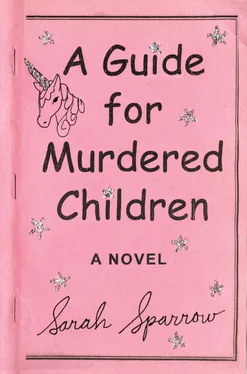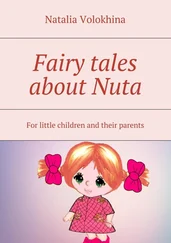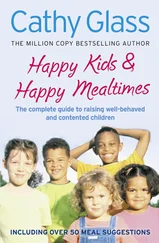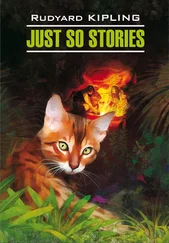Sarah Sparrow - A Guide for Murdered Children
Здесь есть возможность читать онлайн «Sarah Sparrow - A Guide for Murdered Children» весь текст электронной книги совершенно бесплатно (целиком полную версию без сокращений). В некоторых случаях можно слушать аудио, скачать через торрент в формате fb2 и присутствует краткое содержание. Город: New York, Год выпуска: 2018, ISBN: 2018, Издательство: Blue Rider Press, Жанр: Фэнтези, Триллер, Детектив, на английском языке. Описание произведения, (предисловие) а так же отзывы посетителей доступны на портале библиотеки ЛибКат.
- Название:A Guide for Murdered Children
- Автор:
- Издательство:Blue Rider Press
- Жанр:
- Год:2018
- Город:New York
- ISBN:978-0-399-57452-8
- Рейтинг книги:5 / 5. Голосов: 1
-
Избранное:Добавить в избранное
- Отзывы:
-
Ваша оценка:
- 100
- 1
- 2
- 3
- 4
- 5
A Guide for Murdered Children: краткое содержание, описание и аннотация
Предлагаем к чтению аннотацию, описание, краткое содержание или предисловие (зависит от того, что написал сам автор книги «A Guide for Murdered Children»). Если вы не нашли необходимую информацию о книге — напишите в комментариях, мы постараемся отыскать её.
A Guide for Murdered Children — читать онлайн бесплатно полную книгу (весь текст) целиком
Ниже представлен текст книги, разбитый по страницам. Система сохранения места последней прочитанной страницы, позволяет с удобством читать онлайн бесплатно книгу «A Guide for Murdered Children», без необходимости каждый раз заново искать на чём Вы остановились. Поставьте закладку, и сможете в любой момент перейти на страницу, на которой закончили чтение.
Интервал:
Закладка:
How strange was the world of bodies! That a lonely, mountainous, thrown-away gal could make him feel better with her cut-rate fumblings, could heal him, albeit temporarily—how amazing that a crude, perfunctory act resulting in 5ccs of seminal expectoration could allow him instant access to his old friend Hope! How strange and comical, how sweet and grotesquely sad… but in the end, it was just life, or signs of. And where there was life, there was Hope. (Not necessarily Port Hope.) Even though Willow knew that wasn’t necessarily true— Where there are signs of life, there are signs of death, intoned Dark Cop—it seemed to be true. Like the proverbial glass, a person could look at a body and see it as half-alive or half-dead. He preferred to see himself as the former.
Thirty dollars to be healed. Thirty dollars to feel connected to something larger than himself. For bookkeeping purposes, he put the Miranda invoice in the “necessities” file, like water, electricity and tithing.
After the check he wrote to Pace, his account was left with about seven large. The 10K for Larkin’s surgery was in the necessities file too; Willow hadn’t helped the girl in her suicidal teens and he’d be damned if he didn’t help her now. But she needed more than that kind of help, she needed a father’s unconditional love, support, protection. A Band-Aid wouldn’t do—reparations and future deposits were in order. By the time he left the planet, he needed to leave behind a trust fund for his grandson, say, two hundred grand for his education, and something for Pace as well. He’d flushed his earnings as a detective, eating his way through whores and fancy restaurants, losing at horse tracks and gaming clubs. For a few years he went on a Rolex binge, trading up and up and up, and the thought of it turned his stomach. He must have stolen a quarter million from drug dealers but had nothing to show for it.
Asshole.
He put on his faves, Rachmaninoff and Mahler—CDs, because he still hadn’t gotten the Bluetooth/iTunes thing down—and stared into the mirror at his sad sack self. He wore the gift Pace ordered off the Internet, a nightshirt emblazoned with HERD PEOPLE HERD PEOPLE with a cartoony shepherd and flock of sheep bunched below the letters . (He had told her the “Hurt people hurt people” mantra on a phone call from rehab, and this was her retort.) The shirt was in a crazy XXXXL that came down to mid-shin. Willow moved closer to the mirror, peered into his eyes and saw the shadow of death already upon him. He thought of the line he’d read in a Graham Greene novel that he borrowed from Renata at the Meadows—“the anxieties which are beyond the reach of a tranquilizer”—and knew he was beyond tranquilizers, beyond alcohol now.
He hoped he wasn’t beyond solace, and a measure of peace.
Last Sunday, before returning home, he took his grandson to Marlette Park.
Now that he was privy to the backstory, Larkin’s waddle seemed more pronounced and Willow treated him with an excess of devotion and tenderness. No reason to be maudlin about it—just a musculoskeletal problem that a surgeon can fix—but he couldn’t help getting mushy. His defenses had crumbled since he got sober. The world was, after all, a poignantly lacerating, sentimental place. It always had been. Booze just softened the edges, making the epic heartbreak of being human manageable. He wept throughout the day, never knowing what might set him off. He covered a post-orgasmic crying jag with a long, stagey cough while Miranda dutifully fetched the après-sex washrag.
At the park, watching Larkin play, he thought of Pace and the adolescent hell she’d gone through, the hell he’d been absent for. He thought of her mother, Adelaide, and how he once loved her—loved her still. Watching his feisty grandson’s clumsy, twisted, joyful movements, he came to think of other small bodies long gone: Troy and Maya, whom Pace once babysat. Their disappearance really did a number on her. Him too. Because all his life, he’d perversely considered such an event befalling his own, not just Dark Cop’s fantasy but every parent’s. When that terrible day finally came—for the Rummers—the hard-core possibility of such a loss entered his body like a slow-growing, inoperable cancer.
Pace had just turned sixteen when it happened. Willow was in his early forties, on a surprise visit to the Falls from New York, with a birthday puppy in tow. He had moved to Manhattan at thirty-seven, in flight from Adelaide, the woman he loved—the cheater who mauled his heart. (Of course he ignored the truth, for a while anyway: she’d never strayed until there was nothing left of the marriage, never strayed during his dalliances with waitresses, strippers and whores.) Willow hardened and polished the hurt and humiliation until he hyper-shined as a rookie in the NYPD. Pace came to stay at his place in Midtown whenever his impossible schedule allowed—which it never really did. He invited her twice a year, often canceling at the last minute. As her father’s fuck-yous became predictable, her heartbreak matured into rage, her rage into dangerous act-outs of rebellion. Adelaide blamed him for their daughter’s dance with death—and who was he to say she was wrong?
When Addie got too crazy and begged him to intervene, he would fly back to Saggerty Falls for long, stressed-out weekends, the travesty of a helicopter parent—a tourniquet parent, crashing with friends and doing triage on his baby girl, if and when he could find her. At the end of his marriage, he fled the Falls to save himself, taking die-hard heed of his therapist’s enabling counsel. “How can you show up for your daughter until you show up for yourself?” During his oh-so-courageous reinvention and self-renewal, abandoned by her warrior-protector, Pace got badly burned in the not-so-friendly fire.
Hurt people hurt people.
The damage done was the great, consuming shame of his demolished life. When the Rummer kids vanished, it seemed to Willow they’d been sacrificed for his eyes only, a primordial, custom-made metaphor of the consequences of abandonment that caused him to lose his daughter. The detective was forever changed. Brother and sister became twins in a derogatory constellation of transposed grief, a frozen cell slice of his own tragic DNA—Pace became Maya, and Willow became Troy, the older one who had fatally failed to protect.
Watching Larkin and another boy on the slide at the park, Willow wondered what his grandson would become. Genes often skipped generations, which meant the boy just might be heading for rehab and general despondency… “We’re saving a seat for him” was how folks put it in AA.
He remembered the haunting desperation in Adelaide’s voice when she called him in New York at 3:00 A.M. to say she couldn’t do it anymore. They needed to hospitalize Pace, commit her, restrain her, do something or their daughter would surely die. She’d just had Abortion No. 3, overdosing in a seedy motel in its wake, and Adelaide told him that Pace was turning tricks with men she met online. She was no longer living up to the family name, as Grandma Wylde used to say about family members’ misadventures, but dying up to it.
Yet she turned out okay. How did that happen? Dark Cop knew it was just a numbers game. If they made it through their teens without getting hit by a drunk or coming down with a TV-movie disease or getting taken out by bad H —or being shot at school or getting abducted, raped and murdered —actually, they had a pretty decent chance of hanging around awhile.
Willow went over and pushed his grandson in the swing. He drifted back to his own boyhood, remembering the mothball smells and dark wood of his grandparents’ home. He pictured the faded red metal canopy of the deck overlooking the leafy backyard and recalled the visions he’d had as a child. Once, he had a nightmare that Nana had died . He saw her standing at the foot of his bed in a luminous blue wedding gown; when his mother rushed in to comfort him and Willow told her what he’d dreamed, she immediately picked up the phone to call his grandfather. The old man was startled and told her the ambulance had just arrived. Nana was dead in a few hours. After that, Willow stopped sharing his dreams and visions. He didn’t want to cause his mother, or anyone, pain like that again. But he loved Mom for taking his vision seriously, for honoring his gift and giving him that kind of respect. Willow wondered if she’d always known that something was wondrous and peculiar about him from an early age and if such knowledge forced her to listen. To make that midnight call to her father.
Читать дальшеИнтервал:
Закладка:
Похожие книги на «A Guide for Murdered Children»
Представляем Вашему вниманию похожие книги на «A Guide for Murdered Children» списком для выбора. Мы отобрали схожую по названию и смыслу литературу в надежде предоставить читателям больше вариантов отыскать новые, интересные, ещё непрочитанные произведения.
Обсуждение, отзывы о книге «A Guide for Murdered Children» и просто собственные мнения читателей. Оставьте ваши комментарии, напишите, что Вы думаете о произведении, его смысле или главных героях. Укажите что конкретно понравилось, а что нет, и почему Вы так считаете.












